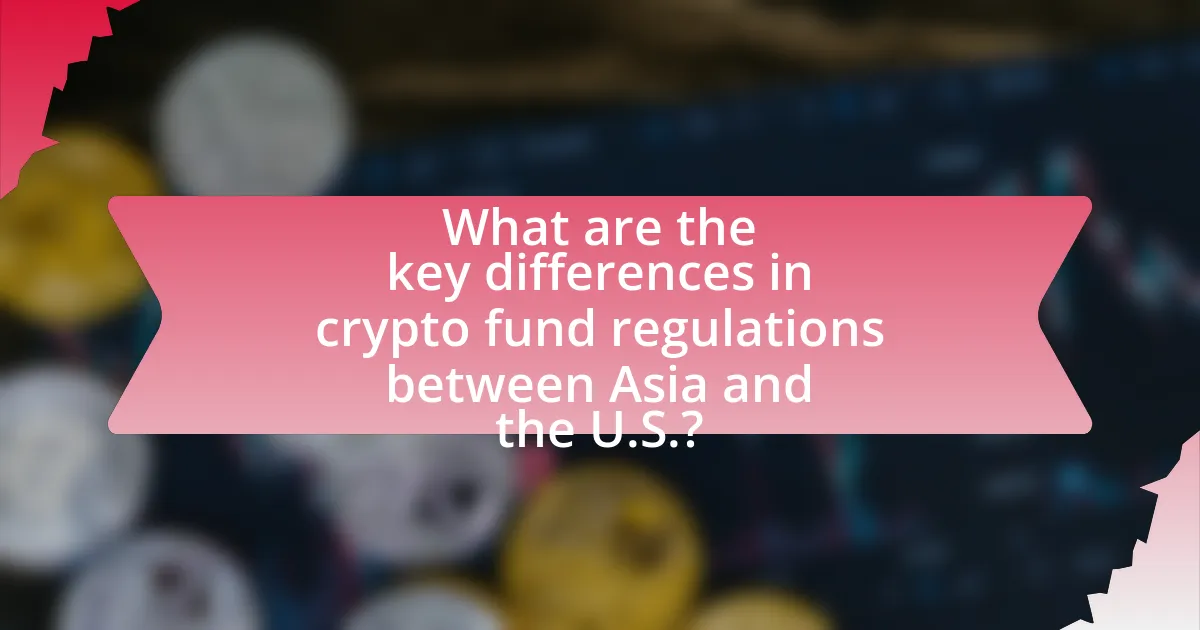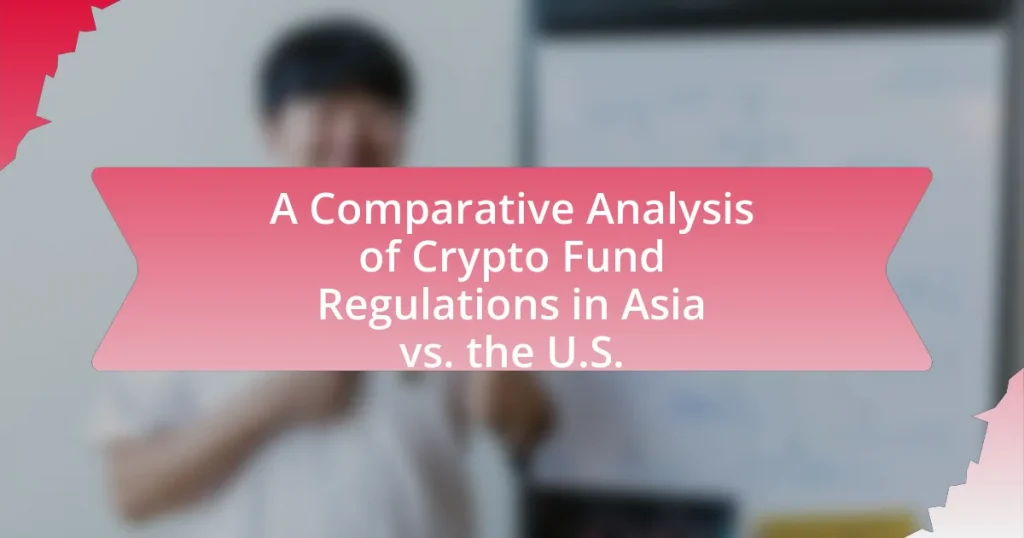The article provides a comparative analysis of crypto fund regulations in Asia and the United States, highlighting key differences in regulatory approaches and frameworks. It outlines how the U.S. Securities and Exchange Commission (SEC) classifies many cryptocurrencies as securities, imposing strict compliance requirements, while several Asian countries adopt more flexible regulations that encourage innovation. The article discusses the roles of various regulatory bodies in both regions, the implications of these regulations for investors, and the challenges faced by crypto funds in navigating the complex regulatory landscape. Additionally, it examines specific regulations in countries like Japan and Singapore, as well as the impact of state-level regulations in the U.S. on crypto fund operations.

What are the key differences in crypto fund regulations between Asia and the U.S.?
The key differences in crypto fund regulations between Asia and the U.S. lie in the regulatory approach and framework. In the U.S., the Securities and Exchange Commission (SEC) classifies many cryptocurrencies as securities, requiring compliance with stringent regulations, including registration and disclosure requirements. Conversely, many Asian countries, such as Singapore and Hong Kong, adopt a more flexible regulatory stance, often categorizing cryptocurrencies as commodities or allowing for regulatory sandboxes that encourage innovation while ensuring investor protection. For instance, Singapore’s Payment Services Act provides a clear licensing framework for crypto businesses, while the U.S. lacks a unified federal framework, leading to a patchwork of state regulations. This divergence reflects broader regulatory philosophies, with the U.S. prioritizing investor protection and compliance, while several Asian jurisdictions emphasize fostering growth and innovation in the crypto sector.
How do regulatory frameworks in Asia compare to those in the U.S.?
Regulatory frameworks in Asia generally exhibit a more fragmented and diverse approach compared to the more unified and established framework in the U.S. In Asia, countries like China have implemented strict bans on cryptocurrency trading and Initial Coin Offerings (ICOs), while others like Singapore have adopted a more favorable regulatory stance, promoting innovation through clear guidelines. In contrast, the U.S. has a more centralized regulatory environment, primarily governed by the Securities and Exchange Commission (SEC) and the Commodity Futures Trading Commission (CFTC), which provide comprehensive regulations for cryptocurrencies and digital assets. This difference is evident in the varying levels of investor protection and compliance requirements; for instance, the U.S. emphasizes consumer protection and anti-money laundering measures, while Asian countries may prioritize innovation or market control, leading to a complex landscape for crypto fund regulations across the region.
What are the primary regulatory bodies overseeing crypto funds in Asia?
The primary regulatory bodies overseeing crypto funds in Asia include the Monetary Authority of Singapore (MAS), the Securities and Exchange Board of India (SEBI), and the Financial Services Agency (FSA) in Japan. The MAS regulates digital payment tokens and requires licensing for crypto service providers under the Payment Services Act. SEBI has issued guidelines for the registration and regulation of crypto funds, while the FSA oversees the licensing of cryptocurrency exchanges and ensures compliance with anti-money laundering regulations. These bodies play crucial roles in establishing a regulatory framework for the operation and management of crypto funds in their respective jurisdictions.
Which U.S. agencies are responsible for regulating crypto funds?
The U.S. agencies responsible for regulating crypto funds are the Securities and Exchange Commission (SEC) and the Commodity Futures Trading Commission (CFTC). The SEC oversees securities laws and regulates cryptocurrencies classified as securities, while the CFTC regulates derivatives and commodities, including certain cryptocurrencies. This regulatory framework is established to ensure investor protection and market integrity in the rapidly evolving crypto landscape.
What are the implications of these regulatory differences for investors?
Regulatory differences between Asia and the U.S. significantly impact investors by influencing their access to investment opportunities and the associated risks. In Asia, more lenient regulations may allow for a broader range of crypto investment options, potentially leading to higher returns but also increased volatility and risk exposure. Conversely, U.S. regulations tend to be stricter, which can provide a more stable investment environment but may limit the variety of available crypto assets. For instance, the U.S. Securities and Exchange Commission has implemented rigorous compliance requirements that can deter some crypto projects, thereby affecting investor choices. These regulatory frameworks shape the overall market dynamics, affecting liquidity, investor protection, and the potential for innovation in the crypto space.
How do regulatory environments affect investor confidence in Asia?
Regulatory environments significantly influence investor confidence in Asia by establishing a framework that either encourages or deters investment. For instance, countries with clear, transparent regulations, such as Singapore, tend to attract more foreign investment due to perceived stability and reduced risk. Conversely, nations with ambiguous or restrictive regulations, like China, often see diminished investor confidence, as uncertainty can lead to hesitance in capital allocation. According to a 2021 report by the Asian Development Bank, countries with robust regulatory frameworks experienced a 30% increase in foreign direct investment compared to those with weaker regulations. This correlation underscores the critical role that regulatory clarity plays in shaping investor perceptions and decisions in the Asian market.
What risks do U.S. investors face due to regulatory uncertainties?
U.S. investors face significant risks due to regulatory uncertainties, including potential legal repercussions, market volatility, and investment losses. The lack of clear guidelines from regulatory bodies such as the SEC creates an environment where investments in cryptocurrencies and related funds may be deemed illegal or subject to sudden regulatory changes. For instance, the SEC’s enforcement actions against certain crypto projects have led to abrupt market reactions, causing substantial financial losses for investors. Additionally, the ambiguity surrounding tax implications and compliance requirements can result in unexpected liabilities, further complicating investment strategies. These factors collectively heighten the risk profile for U.S. investors in the crypto space, making it essential for them to stay informed and adaptable to evolving regulations.

What specific regulations govern crypto funds in Asia?
Specific regulations governing crypto funds in Asia vary by country, with notable frameworks including the Financial Services Agency’s regulations in Japan, the Securities and Exchange Commission’s guidelines in Thailand, and the Monetary Authority of Singapore’s licensing requirements. Japan’s regulations require crypto exchanges to register and comply with anti-money laundering (AML) laws, while Thailand mandates that crypto funds must be registered and adhere to securities laws. Singapore’s Payment Services Act regulates digital payment tokens and requires licenses for crypto service providers. These regulations aim to enhance investor protection and promote market integrity across the region.
How do different Asian countries approach crypto fund regulations?
Different Asian countries adopt varied approaches to crypto fund regulations, reflecting their unique economic contexts and regulatory philosophies. For instance, Japan has established a comprehensive regulatory framework that requires cryptocurrency exchanges to register with the Financial Services Agency, ensuring consumer protection and compliance with anti-money laundering laws. In contrast, China has implemented a strict ban on cryptocurrency trading and initial coin offerings, prioritizing financial stability and risk management. Meanwhile, Singapore promotes a more open environment, allowing crypto funds to operate under the Payment Services Act, which balances innovation with regulatory oversight. South Korea has also taken a proactive stance by enforcing regulations that require exchanges to comply with strict KYC and AML measures. These diverse regulatory approaches illustrate how Asian countries navigate the complexities of cryptocurrency while addressing their specific economic and social concerns.
What regulations exist in Japan regarding crypto funds?
Japan regulates crypto funds primarily through the Financial Instruments and Exchange Act (FIEA) and the Payment Services Act (PSA). The FIEA governs the trading of cryptocurrencies as financial instruments, requiring registration and compliance with specific operational standards for crypto fund managers. The PSA classifies cryptocurrencies as a form of payment and mandates that exchanges and fund operators register with the Financial Services Agency (FSA), ensuring consumer protection and anti-money laundering measures. These regulations were significantly strengthened following the 2014 Mt. Gox incident, which highlighted the need for enhanced oversight in the crypto sector.
How does Singapore regulate crypto investment vehicles?
Singapore regulates crypto investment vehicles primarily through the Monetary Authority of Singapore (MAS), which implements a licensing framework under the Payment Services Act (PSA) and the Securities and Futures Act (SFA). The PSA requires entities dealing in digital payment tokens to obtain a license, ensuring compliance with anti-money laundering (AML) and counter-terrorism financing (CTF) regulations. Additionally, the SFA classifies certain cryptocurrencies as securities, subjecting them to further regulatory scrutiny. This regulatory approach aims to foster innovation while safeguarding investors and maintaining financial stability, as evidenced by MAS’s proactive engagement with industry stakeholders and the issuance of guidelines for token offerings and crypto funds.
What are the common regulatory challenges faced by crypto funds in Asia?
Crypto funds in Asia commonly face regulatory challenges such as inconsistent regulations across jurisdictions, lack of clear legal frameworks, and stringent compliance requirements. For instance, countries like China have imposed outright bans on cryptocurrency trading, while others like Singapore have established more favorable regulations, creating a fragmented regulatory landscape. Additionally, many Asian countries require crypto funds to comply with anti-money laundering (AML) and know your customer (KYC) regulations, which can be complex and costly to implement. This inconsistency and complexity hinder the operational capabilities of crypto funds, making it difficult for them to navigate the regulatory environment effectively.
How do compliance costs impact the operation of crypto funds?
Compliance costs significantly affect the operation of crypto funds by increasing their operational expenses and influencing their investment strategies. High compliance costs can lead to reduced profitability, as funds must allocate substantial resources to meet regulatory requirements, such as anti-money laundering (AML) and know-your-customer (KYC) protocols. For instance, a report by the Financial Action Task Force (FATF) highlights that compliance expenditures can consume up to 10% of a fund’s total operating budget, which constrains their ability to invest in growth opportunities. Consequently, crypto funds may limit their market activities or pass on costs to investors, ultimately impacting their competitiveness in the rapidly evolving crypto landscape.
What role does consumer protection play in Asian crypto regulations?
Consumer protection plays a crucial role in Asian crypto regulations by ensuring the safety and security of investors in the rapidly evolving digital asset market. Regulatory bodies across various Asian countries, such as Japan and Singapore, have implemented frameworks that mandate transparency, require registration of crypto exchanges, and enforce anti-fraud measures to safeguard consumers. For instance, Japan’s Financial Services Agency (FSA) has established strict licensing requirements for cryptocurrency exchanges, which include measures to protect customer assets and ensure operational integrity. This regulatory approach aims to build trust in the crypto ecosystem, mitigate risks associated with fraud and market volatility, and promote responsible trading practices among consumers.

What specific regulations govern crypto funds in the U.S.?
The specific regulations governing crypto funds in the U.S. include the Investment Company Act of 1940, the Securities Act of 1933, and the Commodity Exchange Act. These regulations require crypto funds to register with the Securities and Exchange Commission (SEC) if they offer securities, ensuring compliance with federal securities laws. Additionally, the Financial Crimes Enforcement Network (FinCEN) mandates that crypto funds adhere to anti-money laundering (AML) and know your customer (KYC) requirements. The SEC has also issued guidance indicating that many cryptocurrencies are classified as securities, which further impacts how crypto funds operate.
How do U.S. regulations differ across states for crypto funds?
U.S. regulations for crypto funds vary significantly across states, with some states implementing stringent licensing requirements while others adopt a more lenient approach. For instance, New York mandates a BitLicense for cryptocurrency businesses, which includes compliance with consumer protection and anti-money laundering regulations, whereas states like Wyoming have created a more favorable regulatory environment by offering exemptions and clear guidelines for crypto funds. This disparity is evidenced by the fact that as of 2023, over 40 states have enacted some form of legislation regarding cryptocurrency, leading to a patchwork of regulations that can affect operational costs and compliance burdens for crypto fund managers.
What is the role of the SEC in regulating crypto funds?
The role of the SEC in regulating crypto funds is to enforce securities laws to ensure investor protection and market integrity. The SEC classifies many cryptocurrencies and tokens as securities, which subjects them to regulatory oversight, including registration requirements and compliance with anti-fraud provisions. This classification is based on the Howey Test, which determines whether an asset qualifies as an investment contract. The SEC has taken enforcement actions against entities that fail to comply with these regulations, highlighting its commitment to maintaining a fair and transparent market for investors.
How do state-level regulations impact crypto fund operations?
State-level regulations significantly impact crypto fund operations by establishing compliance requirements that funds must adhere to in order to operate legally. For instance, states like New York have implemented the BitLicense framework, which mandates extensive reporting and operational standards for crypto businesses, thereby influencing how funds manage their activities and investor relations. Additionally, varying regulations across states can create a patchwork compliance landscape, complicating operations for funds that wish to operate in multiple jurisdictions. This regulatory diversity can lead to increased operational costs and necessitate legal consultations to navigate the differing requirements effectively.
What challenges do U.S. crypto funds face in the regulatory landscape?
U.S. crypto funds face significant challenges in the regulatory landscape, primarily due to the lack of clear and consistent regulations. The U.S. Securities and Exchange Commission (SEC) has been cautious in defining which cryptocurrencies qualify as securities, leading to uncertainty for funds regarding compliance. This ambiguity can result in legal risks and operational hurdles, as funds may inadvertently violate securities laws. Additionally, the fragmented regulatory environment across states complicates compliance efforts, as different states may impose varying requirements. According to a report by the Blockchain Association, 70% of crypto firms cite regulatory uncertainty as a major barrier to growth, highlighting the pressing need for clearer guidelines.
How do regulatory ambiguities affect innovation in the U.S. crypto market?
Regulatory ambiguities significantly hinder innovation in the U.S. crypto market by creating uncertainty for businesses and investors. This uncertainty leads to a reluctance to invest in or develop new technologies, as companies fear potential legal repercussions or regulatory changes that could impact their operations. For instance, a 2021 report by the Blockchain Association indicated that 70% of crypto firms in the U.S. cited regulatory uncertainty as a primary barrier to growth. Consequently, this environment stifles competition and slows the pace of technological advancements compared to markets with clearer regulations, such as those in Asia, where defined frameworks encourage innovation and investment.
What are the implications of potential future regulations on U.S. crypto funds?
Potential future regulations on U.S. crypto funds could significantly impact their operational framework, compliance requirements, and market dynamics. These regulations may introduce stricter reporting standards and investor protections, which could enhance legitimacy and attract institutional investment. For instance, the SEC’s potential move to classify certain cryptocurrencies as securities would require funds to adhere to existing securities laws, thereby increasing compliance costs and operational complexity. Historical precedents, such as the implementation of the Investment Company Act of 1940, demonstrate that regulatory frameworks can reshape market structures and influence fund strategies.
What best practices can crypto fund managers adopt to navigate regulations effectively?
Crypto fund managers can navigate regulations effectively by implementing a robust compliance framework that includes regular audits, legal consultations, and continuous education on regulatory changes. Establishing a compliance team dedicated to monitoring both local and international regulations ensures adherence to laws such as the SEC guidelines in the U.S. and the varying regulations across Asian jurisdictions. For instance, in 2021, the Financial Action Task Force (FATF) updated its guidelines, which emphasize the importance of risk-based approaches to compliance, highlighting the need for fund managers to adapt their strategies accordingly. By actively engaging with regulatory bodies and participating in industry discussions, crypto fund managers can stay informed and influence regulatory developments, thereby fostering a proactive compliance culture.
How can crypto fund managers ensure compliance with both Asian and U.S. regulations?
Crypto fund managers can ensure compliance with both Asian and U.S. regulations by implementing a robust regulatory framework that includes thorough legal consultations, adherence to local laws, and continuous monitoring of regulatory changes. This involves engaging legal experts familiar with the specific requirements of jurisdictions in Asia and the U.S., such as the Securities and Exchange Commission (SEC) regulations in the U.S. and various financial authorities across Asian countries. Additionally, maintaining transparent reporting practices and conducting regular audits can help in aligning operations with the evolving regulatory landscape. For instance, the Financial Action Task Force (FATF) guidelines on anti-money laundering (AML) and combating the financing of terrorism (CFT) are applicable in both regions, providing a common compliance baseline.
What strategies can be employed to mitigate regulatory risks in crypto investments?
To mitigate regulatory risks in crypto investments, investors can adopt several strategies, including thorough compliance with local regulations, engaging legal counsel, and implementing robust risk management frameworks. Compliance with local regulations ensures that investments align with the legal requirements of the jurisdiction, reducing the likelihood of penalties or legal action. Engaging legal counsel provides expert guidance on navigating complex regulatory landscapes, particularly in regions with rapidly evolving laws. Additionally, implementing risk management frameworks, such as regular audits and monitoring of regulatory changes, helps investors proactively address potential compliance issues. These strategies are supported by the fact that jurisdictions like Singapore and the U.S. have established clear regulatory guidelines, which, when followed, can significantly reduce the risk of regulatory infractions.















